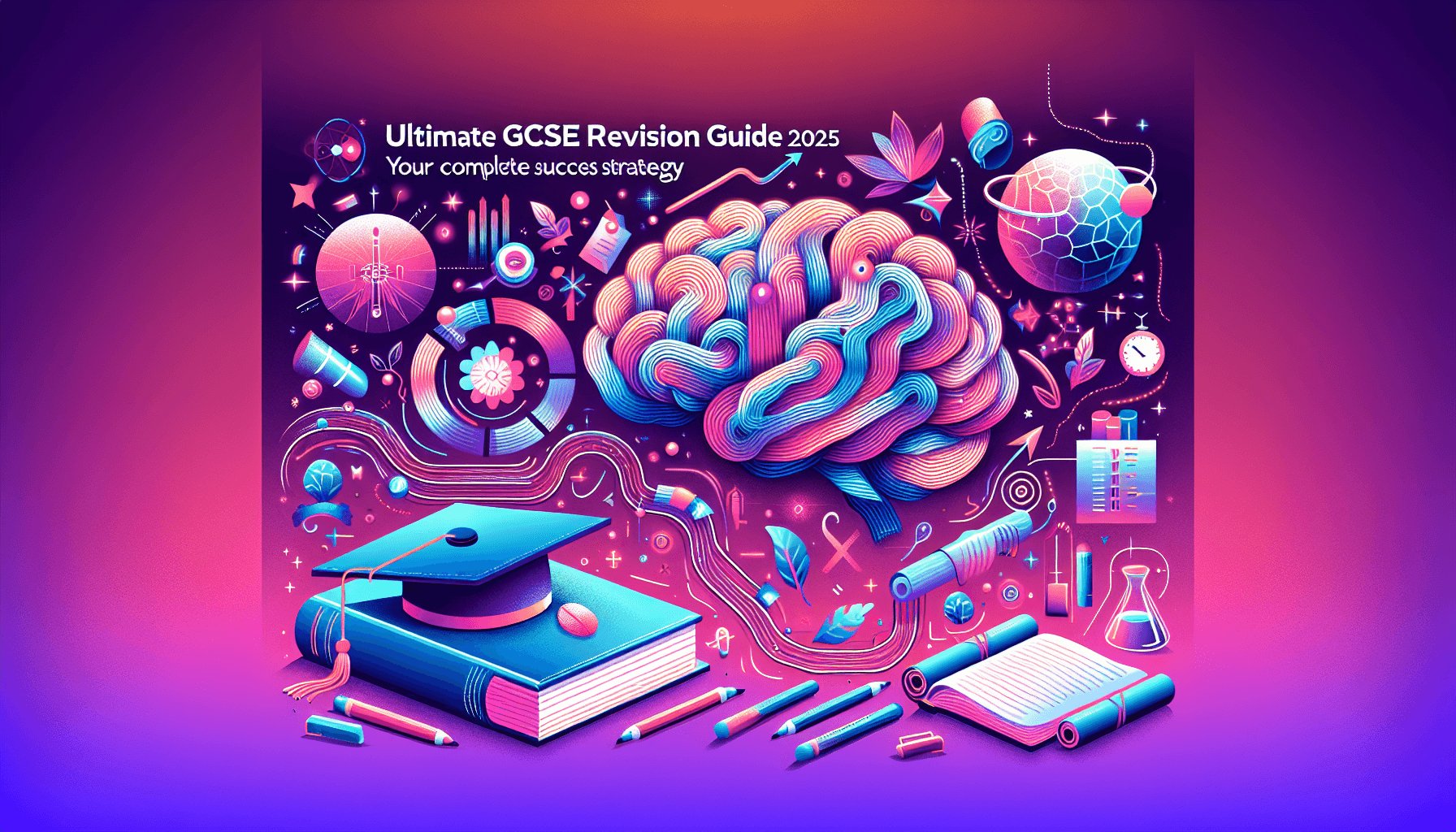
Introduction
As GCSE exam season approaches, many students find themselves feeling a mix of excitement and anxiety. The pressure to perform well can be daunting, but effective GCSE revision doesn’t have to be overwhelming. With the right study strategies, you can enhance your learning, retain information better, and boost your confidence ahead of the big day. In this article, we’ll explore 10 proven study strategies that work, helping you create a robust revision timetable and maximise your study sessions.
1. Create a Revision Timetable
Why a Timetable is Essential
A revision timetable is your roadmap to successful study. It helps you allocate time for each subject, ensuring that you cover all the necessary material without cramming at the last minute.
How to Create One
- List Your Subjects: Write down all the subjects you need to revise for.
- Identify Topics: Break each subject down into topics or units that need attention.
- Allocate Time: Decide how much time you can dedicate to each subject per week.
- Be Realistic: Don’t overload your schedule; include breaks and free time.
- Stick to It: Consistency is key. Try to follow your timetable as closely as possible.
Example: If you have Maths, English, and Science, dedicate 2 hours for Maths on Monday, 1 hour for English on Tuesday, and 3 hours for Science over the weekend. Use tools like StudentNotes.co.uk for structured revision material.
2. Active Learning Techniques
Engage with the Material
Active learning encourages you to engage with the material, making it easier to remember. Here are some effective techniques:
- Summarise Information: After reading a chapter, write a summary in your own words.
- Teach Someone Else: Explaining concepts to others helps reinforce your understanding.
- Use Flashcards: Create flashcards for key terms and concepts. Quiz yourself regularly.
Practical Application
If you’re studying History, summarise a chapter on World War II, then try teaching it to a friend or family member.
3. Past Papers Practice
Importance of Past Papers
Practising past exam papers is one of the best ways to prepare for your GCSEs. They give you insight into the exam format and types of questions you may encounter.
How to Use Them Effectively
- Set Timed Conditions: Mimic exam conditions by timing yourself.
- Review Mark Schemes: Familiarise yourself with how answers are graded.
- Identify Weak Areas: Focus on topics where you struggle most.
Example: If you find yourself consistently scoring low on the English Language papers, dedicate extra time to improving your writing skills.
4. Group Study Sessions
Benefits of Studying with Peers
Studying in a group can provide motivation and different perspectives on the material.
Tips for Productive Group Study
- Set Clear Goals: Determine what you want to accomplish in each session.
- Assign Roles: Each member can take turns leading discussions on different topics.
- Limit Distractions: Choose a quiet space to keep everyone focused.
Example: Form a study group with classmates where each person presents a topic, helping everyone to learn from each other.
5. Use Technology Wisely
Apps and Resources
There are numerous apps designed to assist students in their revision. Some popular ones include:
- Quizlet: For creating flashcards and quizzes.
- Kahoot!: For interactive learning games.
- Forest: To help you stay focused by growing a virtual tree as you study.
Stay Organised
Use digital tools like Google Calendar to keep track of your timetable and deadlines.
6. Break it Down
The Pomodoro Technique
Instead of studying for hours on end, divide your study time into shorter intervals. The Pomodoro Technique involves:
- Studying for 25 minutes.
- Taking a 5-minute break.
- After four intervals, take a longer break of 15-30 minutes.
Benefits
This method helps maintain focus and reduces burnout.
Example: If you’re studying Biology, spend 25 minutes reviewing cell structures, then take a 5-minute break to stretch or grab a snack.
7. Practice Mindfulness
Importance of Mental Well-Being
Exam stress can affect your performance. Incorporating mindfulness techniques can help manage anxiety.
Techniques to Try
- Meditation: Spend a few minutes each day focusing on your breath.
- Deep Breathing: Before starting a study session, take a few deep breaths to calm your mind.
- Positive Affirmations: Remind yourself of your capabilities and set positive intentions for your studies.
8. Healthy Lifestyle Choices
Nutrition and Sleep
Your brain needs fuel to function effectively. Ensure you’re eating a balanced diet rich in fruits, vegetables, and whole grains.
Importance of Sleep
A good night’s sleep is crucial for memory consolidation. Aim for 7-9 hours of sleep per night, especially before exams.
Example: Swap sugary snacks for healthier options like nuts or yogurt to keep your energy levels steady while studying.
9. Review Regularly
Spaced Repetition
Instead of cramming, use spaced repetition to revisit topics over time. This technique improves retention.
How to Implement
- Schedule Reviews: Set specific days to review material you’ve already covered.
- Mix Subjects: Don’t just focus on one subject; mix it up to keep your mind engaged.
Example: Review Maths formulas on Monday, History dates on Tuesday, and English literature themes on Wednesday.
10. Seek Help When Needed
Don’t Hesitate to Ask
If you’re struggling with certain subjects, don’t hesitate to seek help. This could involve:
- Asking Teachers: Don’t be afraid to ask your teachers for clarification or extra help.
- Using Online Resources: Websites like StudentNotes.co.uk provide notes and tutorials that can aid your understanding.
- Private Tutors: If you can, consider hiring a tutor for subjects that you find particularly challenging.
Conclusion
Preparing for your GCSEs can be a daunting task, but with the right strategies in place, you can approach your studies with confidence. Remember to create a well-structured revision timetable, engage actively with your materials, practice past papers, and take care of your mental and physical health. Each of these study strategies can make a significant difference in your preparation and performance.
By following these tips, you’ll not only enhance your knowledge but also build the skills necessary to tackle your exams effectively. Good luck, and remember: consistent effort and a positive mindset are key to success!
Key Takeaways:
- Start early with a structured revision timetable.
- Engage actively with the material and use past papers for practice.
- Don’t forget to maintain a healthy lifestyle and seek help when needed.
Tags: [GCSE, Revision Tips, Study Strategies, Exam Preparation, Student Life]
Want to Study Smarter, Not Harder?
Join 1,000+ students using AI to ace their exams
Sign up free and transform your study materials into comprehensive notes, flashcards, and quizzes in seconds
AI-Powered Notes
10 free generations every month
Any Format Supported
PDFs, Word, YouTube, and more
Instant Flashcards
AI-generated Q&A for revision
Progress Tracking
Gamified achievements & streaks
✓ No credit card required • ✓ Free forever plan • ✓ Cancel anytime
StudentNotes Team
Passionate about helping students achieve their academic goals through effective study techniques and AI-powered learning tools.
